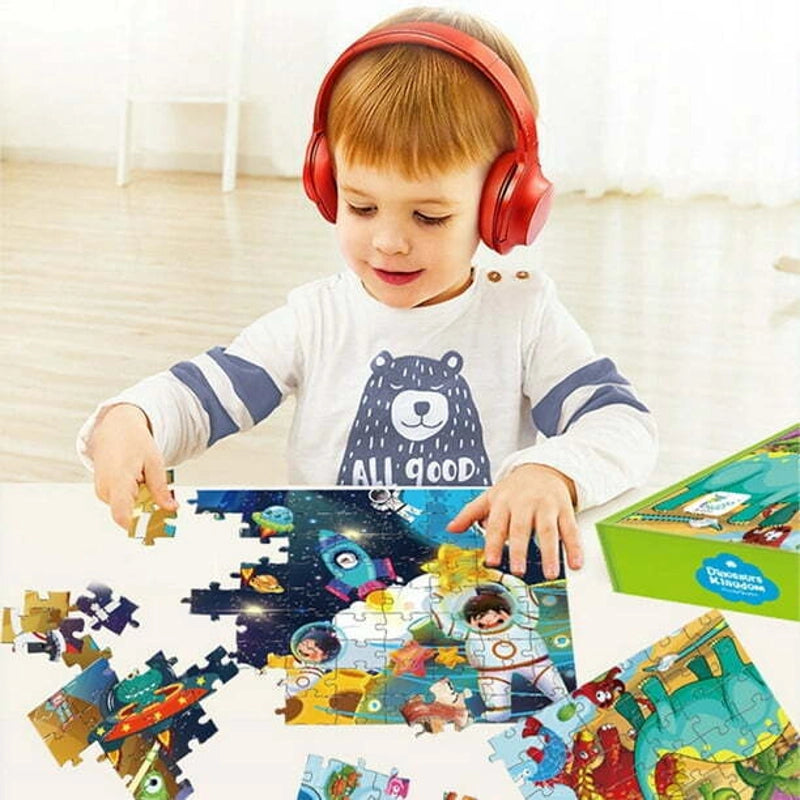
How do puzzles improve my child's brain development?
Toyland TreasuresShare
How Do Puzzles Improve My Child's Brain Development?
Puzzles have been cherished by generations, not only for their entertainment value but also for their developmental benefits. Engaging in puzzle-solving activities can significantly enhance a child's cognitive abilities, fine motor skills, and overall brain development. Here's a comprehensive look at how puzzles can aid your child's growth:
Cognitive Skills and Problem-Solving
Puzzles are excellent tools for developing critical thinking and problem-solving skills. When children work on puzzles, they are required to think strategically about how to fit pieces together, recognize patterns, and follow sequences. This process enhances their ability to solve problems methodically and logically.
- Pattern Recognition: Identifying patterns and figuring out how pieces fit together improves a child's ability to recognize and create patterns, a skill crucial for mathematics and reading.
- Strategic Thinking: Puzzles require children to plan their moves and think ahead, fostering strategic thinking and planning abilities.
Fine Motor Skills and Hand-Eye Coordination
Manipulating puzzle pieces enhances fine motor skills and hand-eye coordination. The act of picking up, rotating, and fitting pieces into place requires precision and control, strengthening the small muscles in a child's hands and fingers.
- Dexterity Improvement: Regular practice with puzzles can improve dexterity and hand control, which are essential for writing and other manual tasks.
- Coordination Development: Eye-hand coordination is crucial for many activities, from sports to simple daily tasks. Puzzles help refine this coordination by requiring the eyes and hands to work together efficiently.
Memory and Focus
Puzzles also play a significant role in boosting memory and concentration. Remembering shapes, colors, and the overall design of the puzzle helps to enhance memory skills. Additionally, the focus required to complete a puzzle can increase a child's attention span and ability to concentrate on tasks.
- Visual Memory: Children need to recall the appearance and position of pieces to complete the puzzle, which strengthens visual memory.
- Attention Span: The commitment to finishing a puzzle encourages children to focus for extended periods, gradually increasing their attention span.
Spatial Awareness
Working on puzzles helps children understand spatial relationships and how different pieces fit together within a space. This spatial awareness is critical for everyday tasks and academic skills, particularly in subjects like geometry.
- Spatial Reasoning: Puzzles teach children to visualize how pieces fit together and how they can manipulate objects in their mind, enhancing spatial reasoning skills.
- Orientation Skills: Recognizing how shapes and patterns fit together aids in understanding the orientation of objects in space.
Emotional and Social Skills
Puzzles can also contribute to emotional and social development. Completing a puzzle provides a sense of achievement and boosts confidence. When working on puzzles with others, children learn valuable social skills such as cooperation, sharing, and communication.
- Confidence Building: Successfully finishing a puzzle gives children a sense of accomplishment, boosting their self-esteem and confidence.
- Social Interaction: Puzzles often involve teamwork, which teaches children how to collaborate, share, and communicate effectively.
Creativity and Imagination
Puzzles can stimulate creativity and imagination. They often involve thinking outside the box and finding new ways to approach problems. This creative thinking can translate into other areas of learning and play.
- Creative Problem-Solving: Puzzles encourage children to think creatively to solve problems, enhancing their innovative thinking abilities.
- Imaginative Play: Many puzzles are themed, allowing children to immerse themselves in different scenarios and stories, fostering imaginative play.
Academic Benefits
Engaging with puzzles can also have direct academic benefits. The skills developed through puzzle-solving—such as pattern recognition, memory, and critical thinking—are foundational for subjects like mathematics, reading, and science.
- Math Skills: Recognizing patterns, shapes, and sequences helps build a foundation for math skills, including addition, subtraction, and geometry.
- Reading Skills: The focus and concentration required for puzzles also aid in developing reading skills, such as comprehension and attention to detail.
Unique Benefits of Puzzles
In addition to the well-documented benefits, puzzles offer some unique advantages that set them apart from other educational toys and activities:
- Grit and Perseverance: Working through the challenges of a puzzle and not giving up fosters perseverance and resilience.
- Relaxation and Stress Relief: The meditative nature of puzzle-solving can help calm anxious children and provide a relaxing break from more active play.
Long-Term Benefits of Puzzle-Solving
Incorporating puzzles into your child's daily routine is an excellent way to support their brain development and overall growth. The long-term benefits of engaging with puzzles extend far beyond childhood, providing foundational skills that will serve them well into adulthood.
At Toyland Treasures, we offer a wide variety of puzzles designed to challenge and delight children of all ages. Whether they are working on a simple jigsaw puzzle or tackling a more complex logic puzzle, the skills they develop will benefit them in countless ways. So next time you're looking for an engaging and educational activity, consider the humble puzzle from Toyland Treasures and watch your child's abilities flourish.